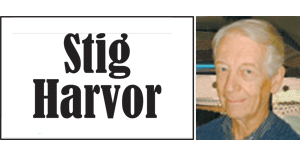Stig Harvor –
This month we Torontonians face our third significant election within the short span of 16 months.
We have already elected new Ontario and Toronto governments. On Oct. 19 we elect a new Canadian federal government.
Despite possible voter fatigue, we rightly insist elections are a vital part of democracy. 
We tend to say we get the government we deserve. Wrong. What we really deserve is that the distribution of parliamentary seats reflects the actual will of the voters
This is not the reality (see website: www.FairVoteCanada). Our present voting system is based on the simplistic, ancient Anglo-Saxon principle called First-Past-The-Post (FPTP): A candidate is elected in a riding by simply winning more votes than any of the other candidates.
Votes for the other candidates are effectively wasted. They do not result in any seats. This discourages people to vote in the first place. Or they turn to what is called “strategic voting.” If they want a change of government, they do not vote for the candidate representing the party of their choice.
Instead they vote for a candidate they think has the best chance to defeat the government candidate (see The Bulletin column, of April, 2014).
If we want true democracy we need Proportional Representation (PR). With PR every vote counts. The number of seats of each party is basically proportional to the number of votes they attract.
The NDP with Tom Mulcair and the Greens with Elizabeth May intend to replace our existing FPTP system with PR. The Liberals with Justin Trudeau want an all-party committee to study alternatives to FPTP. The Conservatives with Stephen Harper want to keep FPTP which gave them a 54% majority of seats with only 40% of all votes in 2011.
Whatever the value and accuracy of our many public opinion polls, early ones have mostly indicated a tight 3-major-party-race with none winning a majority of seats.
The government will be formed by whichever party ends up with most seats, not necessarily most votes.
If two or more other parties combined have more seats, however, they can defeat the government. They must then negotiate a coalition or an accord between themselves.
A coalition means sharing cabinet positions. An accord signifies an agreement to implement certain policies without sharing power. Since Confederation, there has been only one federal coalition government but a number of accords. At present, Trudeau firmly opposes a coalition while Mulcair and May are willing to negotiate. Although not necessarily dictating Harper’s political actions, what may influence his conservative political views?
A revealing insight is found in the new book Canada After Harper published by James Lorimer. According to a chapter by Joyce Nelson, Harper has attended for some decades the fundamentalist, evangelistic Christian Missionary Alliance Church —as has Preston Manning.
The church has 2.5 million members worldwide with one-fifth living in North America. It believes the Bible is infallible and the Second Coming is imminent. In 2006 it was estimated there were 70 evangelicals in Harper’s caucus.
Harper has chosen the longest (11-weeks) and most-expensive election period in our country’s modern history. It is thought he did so because he had more money than the opposition parties combined to spend on partisan election advertising and sloganeering.
With his deep pockets, Harper is sparing no time and money in deplorable attack ads against his opponents. Sadly they seem be effective by appealing to weaknesses in our human nature.
The emphasis is on personality, not issues. Issues are often complicated. Better to stir up people’s emotions.
Harper’s election strategy is to instill the powerful emotion of fear in people: Fear of change, of deficits and of “terrorists.” Canadians react to the unspeakable atrocities of religious extremists in the Middle East. They also remember the shocking attack on Parliament Hill by a deranged extremist last year. (Where did he get his gun?)
If another Canadian “terror act” were to occur—or only suspected—before the election, Harper would quickly gain undeserved support. There is even the danger some agent provocateur of masked police in civilian clothes could provoke an incident to fan the flames of fear.
This despicable tactic was actually used by the police in Montebello, Que. during the August 2007 peaceful public demonstration against secret government negotiations on the Security and Prosperity Partnership with the United States.
We need and deserve truly fair elections not based on money, tightly controlled and staged public events, debate refusals, and to top it off, a faulty election system.
Posted On: October 01, 2015
 TheBulletin.ca Journal of Downtown Toronto
TheBulletin.ca Journal of Downtown Toronto

